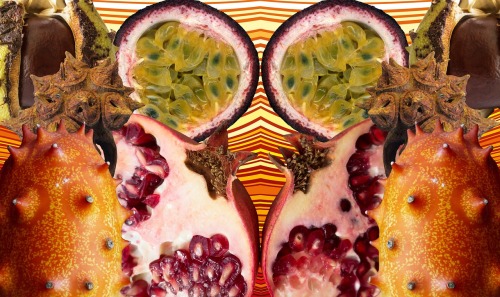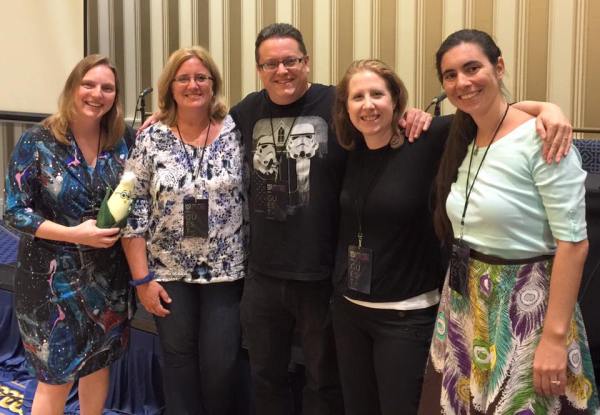
I had the amazing opportunity this past weekend to moderate a panel on the Future of Food at the Escape Velocity conference hosted by the Museum of Science Fiction in Washington, DC. It was a pleasure to have a diverse panel (panelist bios are below) where we all had different perspectives to bring to the discussion.
I think my favorite part was the audience participation, with many excellent questions and comments. We ran 1 hour and 15 minutes but it could have been a whole day event, so I wanted to bring the discussion here.
Where do you think the future of food is headed?
- Farmer and dietician Jennie Schmidt talked about some amazing technologies she’s using today on her farm and that we might look forward to in the future, such as microbes that change the pH of the soil around a plant’s roots to help the plant take up nutrients more effectively.
- Food and pop culture writer Nevin Martell brought us back to the cultural aspects of food, including how more and more foods and beverages will be personalized in the future. Specifically, he envisions in-home roasting of coffee beans so we can all get that perfect cup.
- Science and parenting writer Jenny Splitter mentioned the possibilities of genetic engineering to bring us allergen-free foods and other consumer-oriented traits. She is hopeful despite a more pessimistic article about allergen-free peanuts that she wrote recently (Allergy-Free Peanuts? Not So Fast).
- Meat science expert Jessica Meisinger talked about how we’ll need to do more with less. When selecting pet foods, she urges us to consider that predatory animals naturally go for the entrails. It doesn’t make sense to feed dogs and cats human grade meat that could be feeding humans instead.
- Plant geneticist Anastasia Bodnar (that’s me!) discussed creative ways to deliver nutrients while using less land. This includes products like Soylent, growing food in vats like Quorn, and increased use of algae as a food source for humans.

What are some far out examples of food that may be in our distant future?
We didn’t get much time to discuss food in science fiction, though there is a lot to talk about! Some of my favorites are…
- Genetically engineered trees controlled by empathetic faun-like creatures to produce any food you could want (Copernick’s Rebellion).
- Humans who have been genetically engineered directly (perhaps by gene drive?) to photosynthesize so they no longer need food (Beggar’s series).
- And of course I have to mention the replicator where your food of choice is created from nothing, atom by atom (Star Trek).
What futuristic foods can we enjoy today?
In addition to Soylent and Quorn, there are tons of examples of futuristic foods that have appeared first in science fiction then made into reality. Technovelgy has a list of Food in Science Fiction that includes such hypothetically tasty treats as powdered alcohol and cultured meat. Another futuristic food that I’m looking forward to trying is synthetic wine by Ava Wineries.
While I was researching this post, I found two fun websites that share recipes for food from science fiction and other works of fiction. If you know of any other sites like this, please share.
- The Geeky Chef (@TheGeekyChef) also has a cookbook you can buy for easier consumption.
- Cook Fiction (@CookFiction) also has a Cook Fiction Wiki where you can contribute your own fiction inspired recipes!
- There’s also many, many cookbooks for recreating fictional dishes. Check them out on Amazon – and use Amazon Smile to support Biology Fortified! I have the Diskworld Cookbook, though admittedly I have yet to make anything from it.
Panel description…
- From food pills to growing green lumps, the food of the future presented in science fiction is often unrecognizable and unappetizing. These foods give their worlds an unfamiliar, alien feeling, but probably don’t represent real developments in the future of food. The real future of food is tied to our health, our environment, and a changing world. We’ll discuss what emerging food technologies may solve problems we face today, and imagine what more distant challenges like space travel may mean for the food of the distant future.
Bios for our awesome panel…
- Dr. Anastasia Bodnar (@geneticmaize) has been a science communicator with a focus on biotechnology since 2007. She is the Policy Director of Biology Fortified, Inc., an independent non-profit devoted to providing science-based information about food and agriculture. Anastasia now works in environmental compliance for pest control programs. She previously served in the US Army, leading teams in health and safety inspections and consulting on integrated pest management. Anastasia’s was inspired to study genetic engineering by Leo Frankowski’s book Copernick’s Rebellion and can’t wait to share her love of science fiction with her two-year old daughter.
- Jennie Schmidt (@FarmGirlJen) is a third generation farmer on the Eastern Shore of Maryland who practiced for over a decade as a Registered Dietitian. With her family, she practices synergistic farming, using the best of all farming methods to create healthy soils to sustain healthy food production. As an “ag-vocate” she has worked with the Ministry of Agriculture in Botswana, represents the state of Maryland on the National Barley Growers Association, serves as the first female President of the Maryland Grain Producers. Jennie blogs as The Foodie Farmer.
- Nevin Martell (@nevinmartell) has been writing about food, travel, parenting and culture for nearly two decades. His work has appeared in The Washington Post, The New York Times, Saveur, Fortune, and many other publications. He is also the author of seven books, including The Founding Farmers Cookbook, the small press smash Looking for Calvin and Hobbes: The Unconventional Story of Bill Watterson and His Revolutionary Comic Strip and Standing Small: A Celebration of 30 Years of the LEGO Minifigure.
- Jenny Splitter (@jennysplitter) is a writer, storyteller, recovered lawyer and mother of two. She writes about food, agriculture, and parenting among many other topics. A regular contributor for Grounded Parents and Fitness Reloaded, she has been published in Salon, Refinery29, the Scientific American Blog Network and Science 2.0. When she isn’t chauffeuring her children or trying to wrap her head around CRISPR, she really likes to torture herself by telling her most embarrassing stories in front of a live audience. She has performed for Story District, the Risk! podcast, Perfect Liars Club and the Unified Scene Theater. Since 2014, she has also served on Story District’s Board of Directors.
- Dr. Jessica Meisinger (@Renderers) is the director of Science Education and Communication for the National Renderers Association and the Fats and Proteins Research Foundation. As such, she runs the communication and education outreach for a vital part of the animal agriculture food chain that is regularly forgotten. She is a PhD Meat Scientist who can hear you all currently thinking “I didn’t know you could get a PhD in Meat Science” and is a first round draft pick on most zombie apocalypse teams for her ability to butcher and preserve meat. Jessica fell in love with manufacturing while watching crayons getting made on Sesame Street.